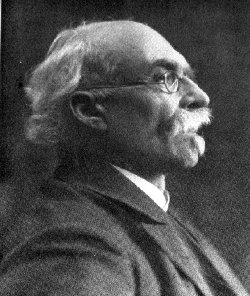<Back to Index>
- Philosopher Hans Vaihinger, 1852
- Composer Dmitri Dmitriyevich Shostakovich, 1906
- 7th President of Italy Alessandro (Sandro) Pertini, 1896
PAGE SPONSOR

Hans Vaihinger (September 25, 1852 – December 18, 1933) was a German philosopher, best known as a Kant scholar and for his Philosophie des Als Ob (Philosophy of As If), published in 1911, but written more than thirty years earlier.
Vaihinger was born in Nehren, Württemberg, Germany, near Tübingen, and raised in what he himself described as a "very religious milieu". He was educated at Tübingen, Leipzig, and Berlin, became a tutor and later a philosophy professor at Strasbourg before moving to the university at Halle in 1884. From 1892, he was a full professor.
In Philosophie des Als Ob, he argued that human beings can never really know the underlying reality of the world, and that as a result we construct systems of thought and then assume that these match reality: we behave "as if" the world matches our models. In particular, he used examples from the physical sciences, such as protons, electrons, and electromagnetic waves. None of these phenomena have been observed directly, but science pretends that they exist, and uses observations made on these assumptions to create new and better constructs.
Vaihinger admitted that he had several precursors, especially Jeremy Bentham's Theory of Fictions. In the preface to the English edition of his work, Vaihinger expressed his Principle of Fictionalism. This is that "an idea whose theoretical untruth or incorrectness, and therewith its falsity, is admitted is not for that reason practically valueless and useless; for such an idea, in spite of its theoretical nullity, may have great practical importance."
This philosophy, though, is wider than just science. One can never be sure that the world will still exist tomorrow, but we usually assume that it does. Alfred Adler, the founder of Individual Psychology, was profoundly influenced by Vaihinger's theory of useful fictions, incorporating the idea of psychological fictions into his personality construct of a fictional final goal.
Frank Kermode's The Sense of an Ending (1967) was an early mention of Vaihinger as a useful methodologist of narrativity.
Later, James Hillman developed both Vaihinger and Adler's work with psychological fictions into a core theme of his work Healing Fiction in which he makes one of his more accessible cases for identifying the tendency to literalize, rather than "see through our meanings," (HF 110) with neurosis and madness.